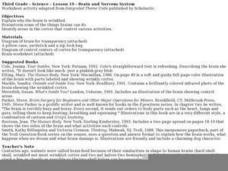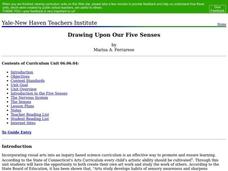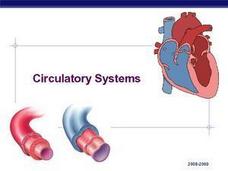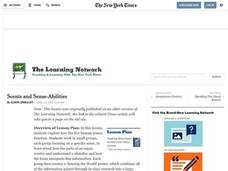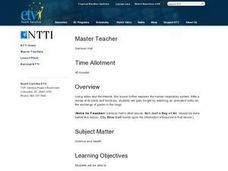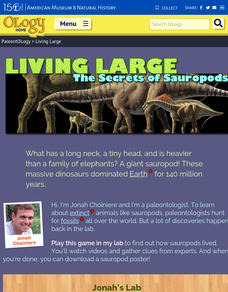Curated OER
The Real Deal on the Digestive System
Sixth graders explore the human body by viewing video clips. In this digestive system lesson plan, 6th graders discuss what they think happens when they swallow food. Students view a Brain Pop clip demonstrating the digestion of food and...
Curated OER
Anatomy of the Brain
Learners explore the brain. In this science lesson, students view a diagram of the brain and discuss the various regions of the brain. Learners discuss the importance of protecting the brain and design a protective covering.
University of Minnesota
Connect the Neurons!
Create a neuron frenzy as your pupils play the part of the neurons. An engaging lesson creates a human chain of neurons that pass cotton balls posing as neurotransmitters. Scholars learn about pre- and post-synapses as they complete the...
Howard Hughes Medical Institute
Neural Control of Walking and Running
Physical therapists state that relearning how to walk often motivates stroke and brain injury patients. Researchers spend a great deal of time focused on understanding the neural control required for walking. They pass along that...
Curated OER
How Alzheimer's Affects the Brain
Pupils study how Alzheimer's affects different parts of the brain, sketch a healthy neuron and its parts, and diagram brain changes during the early and late stages of Alzheimer's.
Curated OER
Tales From The Tummy
Learners use creative writing in order to review the digestive system and other various parts of the human body. They write a creative story about a hamburger and the journey it takes during digestion. The lesson includes key words that...
Curated OER
Brain and Nervous System
Third graders study the physical characteristics of the brain and identify its parts through this series of lessons.
Curated OER
Brain Watching
Students identify the different parts of the nervous system. In this biology instructional activity, students research methods to diagnose and cure neurological disorders. They present their report to class.
Curated OER
An Eye on Science
Students investigate the human eye and its parts. They read and discuss various books about eyes and sight, draw a rough draft of an eye diagram, and create a final draft of their eye diagram including labeled parts using Kid Pix...
Curated OER
Drawing Upon Our Five Senses
Students observe and create artistic representations, technological images, and scientific diagrams. They explore the five senses, the structure and function of the corresponding organs, and how the senses are connected to the human brain.
Curated OER
Circulatory Systems
A slideshow that covers the all-important details related to basic human circulation. The reasoning for exchange of material methods is presented and then labeled diagrams of the main human transfer systems are shown, along with...
Curated OER
Human Evolution
Students investigate hominid evolution to learn the difference between a relative and an ancestor. They study the emergence of bipedalism and the related physical adaptations and cultural ramifications, and chart patterns of hominid...
NASA
Collecting Electromagnetic Radiation
Astronomy is literally over your head, but this lesson will explain how we study it. Young scientists make telescopes, calculate and compare the light gathering power of lenses, and simulate detection of infared radiation. Materials...
Curated OER
The Real Bionic Man
High schoolers examine the work that scientists have been doing to create artificial human parts. For this exploratory lesson students research the human eye and brain using the Internet.
Curated OER
Primate Evolution
In this primate evolution worksheet, learners use a diagram showing different primate adaptations to complete 3 short answer questions comparing human traits and primate traits.
Curated OER
Levels of Classification
Students use diagrams to compare structural differences that taxonomists use to classify animals. For this classification lesson plan, students compare structures of different species from given diagrams. In one diagram they identify the...
Curated OER
Scents And Sense-Abilities
Students explore how the five human senses function. They work in small groups, each group focusing on a specific sense. Each group then creates a 'Sensing the World' poster which combines all of the information gained through in-class...
Biology Junction
Mollusks
Mollusks created every shell on Earth. Young scientists learn more about the phyllum mollusca in an informative presentation. It covers their characteristics, body plans, and relationships in the ecosystem. Then, it details each class of...
Curated OER
Exploring the Nervous System Through Disease and Injury
Students are introduced to the nervous system. In groups, they research the relationship between disease and injury and how it affects the nervous system. To end the lesson, they present their findings to the class and create a poster.
Curated OER
Neuron Creations
Students examine neurons. In this nervous system lesson, students build models of neurons in order to study their parts and functions.
Curated OER
The Nervous System and the Effects of Drugs
In this nervous system worksheet, students read information about how the body receives and sends out information through the peripheral nervous system and central nervous system. Then students complete 3 short answer questions.
Curated OER
CO2 Blow Out!
Fifth graders determine that carbon dioxide is a gas given off during respiration and that oxygent is the gas that is absorbed during respiration. They determine the air capacity of the lungs.
Curated OER
Coordination
Multiple choice, fill-in-the-blank, short answer, and matching questions are all here in a multi-page worksheet or quiz. While the formatting leaves a little to be desired, it would take just a few minutes to change the handout into a...
American Museum of Natural History
Living Large
Get to know all about sauropods from a paleontologist, Jonah. Following an introductory video, scholars choose from five fossils to learn more about. Each fossil begins with a video, provides information from several different...








